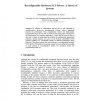Free Online Productivity Tools
i2Speak
i2Symbol
i2OCR
iTex2Img
iWeb2Print
iWeb2Shot
i2Type
iPdf2Split
iPdf2Merge
i2Bopomofo
i2Arabic
i2Style
i2Image
i2PDF
iLatex2Rtf
Sci2ools
118
click to vote
FPL
2003
Springer
2003
Springer
Reconfigurable Hardware SAT Solvers: A Survey of Systems
By adapting to computations that are not so well supported by general-purpose processors, reconfigurable systems achieve significant increases in performance. Such computational systems use high-capacity programmable logic devices and are based on processing units customized to the requirements of a particular application. A great deal of research effort in this area is aimed at accelerating the solution of combinatorial optimization problems. Special attention was given to the Boolean satisfiability (SAT) problem resulting in a considerable number of different architectures being proposed. This paper presents the state-of-the-art in reconfigurable hardware SAT satisfiers. The analysis of existing systems has been performed according to such criteria as reconfiguration modes, the execution model, the programming model, etc.
Related Content
| Added | 06 Jul 2010 |
| Updated | 06 Jul 2010 |
| Type | Conference |
| Year | 2003 |
| Where | FPL |
| Authors | Iouliia Skliarova, António de Brito Ferrari |
Comments (0)

